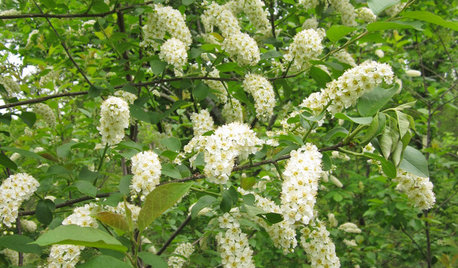Alternative to Round-Up?
Hello, everyone! My goal is to transition exclusively to an organic garden, but the use of Round-Up represents a time savings that i would dearly miss. Is there an organic alternative?
I've read about white vinegar being an effective "point and squirt" method for weed control, but i'll be planting fruit trees very soon and i'm worried about altering ph.
Any feedback? Must i completely give Round-Up up (up up and away!)?
Comments (46)
fruitgirl
16 years agoThere are no organic herbicides that function as Roundup does (ie systemic and often kills the plant with a single application). Vinegar functions by burning the leaf tissue, and usually requires repeated applications to kill plants, unless they are sprayed at an *extremely* young stage.
If you really and truly want to be organic, then yes, you shouldn't use Roundup. If you want to be sustainable, and only spray when and what you consider to be necessary, then Roundup is maybe ok. You'll have to decide for yourself what you want. Personally, in terms of human safety, I think there are many more non-organic products that pose more of a health risk. But, again, that's something you have to determine for yourself.
justaguy2
16 years agoThere is no organic equivalent to RoundUp. The reason is that roundup travels from the above ground portion of the plant into the roots and then kills the roots.
There are many weeds which ordinary household vinegar can kill, but many will just regrow from the roots. There is a stronger formulation of vinegar not available at groceries, but sometimes other places that is more effective, but even so it only kills what it comes in contact with, it doesn't move through the plant to the roots.
The good news is that vinegar isn't going to change your soil's pH. It simply isn't potent enough to leave any lasting impact on pH. It will result only in a temporary (hours to days) acidification in the area it was used.
If you will be planting fruit trees my question is why would you need any herbicide or any type for this? I also have fruiting trees and shrubs, but I just remove the sod from the area (3-4 inches down), use plastic edging around the area and top it off with 3" or so of wood chip mulch. It's not that no weeds ever grow, but they are very easy to control by hand as there aren't many and most aren't well rooted in the soil.
Related Professionals
North New Hyde Park Landscape Architects & Landscape Designers · Edmond Landscape Contractors · Bell Gardens Landscape Contractors · Gloucester Landscape Contractors · Hickory Hills Landscape Contractors · Salem Landscape Contractors · Sammamish Landscape Contractors · Weslaco Landscape Contractors · Whitehall Landscape Contractors · Goldenrod Landscape Contractors · Raytown Landscape Contractors · Baltimore Decks, Patios & Outdoor Enclosures · Quincy Decks, Patios & Outdoor Enclosures · Saint Louis Park Decks, Patios & Outdoor Enclosures · Troy Decks, Patios & Outdoor Enclosuresestreya
Original Author16 years agoThank you for your replies!
Actually, justaguy2 (Do you know justaguy1? Did he meet an untimely demise? I suspect foul play!), the area where i use Round-Up is quite a distance from where the fruit trees will be planted. But i'm completely out of my depth as far as understanding how chemicals can travel through the soil, air and water. I thought to be prudent, i'd try to avoid using anything "bad" anywhere on the five acres i inhabit, even if the fruit trees are clear on the other side of the property.
Fruitgirl, you make a keen point about sustainability! I'll work on educating myself about the chemicals in Round-Up so i can make an informed decision. I have a feeling i'll end up using it sparingly.
Thanks guys!
justaguy2
16 years agothe area where i use Round-Up is quite a distance from where the fruit trees will be planted. But i'm completely out of my depth as far as understanding how chemicals can travel through the soil, air and water.
RoundUp sprayed on a plant doesn't move through the soil at all. There have been cases of ground water contamination from it, but this is usually agricultural use where large quantities were used near either a water body or in areas with a high water table.
The biggest concern and it is indeed a significant one is airborne drift. Even a light mist will kill desirable plants and there is no hope of recovery once the product is on them.
With 5 acres you are pretty safe though. If you wish to use the RoundUp then do so on days with little or no wind and consider the direction the wind is blowing in for 100 feet or so.
If you find yourself with 'open' areas on that 5 acres where weed growth is a continual problem, consider purchasing wild flower seed in bulk and broadcasting it liberally in the area after cutting the weeds down. Wild flowers, particularly native ones, can often reduce the weed population and replace it with beautiful blooming plants.
ronalawn82
16 years agoestreya, the active ingredient in 'Roundup', glyphosate, is deactivated when it contacts the soil. That is why it is useless as a pre-emergent weed killer. The critical factor about applying it is the droplet size. You adjust pressure so that the drops are small enough to sit on the leaf of the undesirable plant but not so small as to cause misting. The concensus is that the product has a place in sustainable gardening but not in organic (certified) gardening.
estreya
Original Author16 years agoThank you so much everyone! Wonderful information here. I'm sure i'll have lots more questions as i transition to a "sustainable" if not certifiably organic landscape.
led_zep_rules
16 years agoYou didn't explain exactly what it is you normally use Round-Up for. When I want to kill all the vegetation in an area, I cover it with cardboard. So that is one possible alternative for you. Not fast, obviously, but you don't have to worry about breathing poison or anything. For individual weeds I just dig them out. Again, not fast, but completely harmless. That is mainly limited to things growing in my garden space that shouldn't be there.
Marcia
estreya
Original Author16 years agoYou're right Marcia, i did lack specificity.
I do pull weeds as my back and their intermittent nature allows. However, there's a thick "bed" of river rock that separates the roadside from the lawn grass. As thick as the layer is, weeds still sprout up between the rocks. Unless i lift the rocks to get to the base of the weed, it just snaps off in my hand, completely spoiling my ordinarily sunny countenance.
In this particular area, i find it so much easier to just "point and squirt."
Kimmsr
16 years agoGlyphosate products simply are not acceptable things for an organic gardener to use.
The acceptable methods to control unwanted plant growth are mechanical removal, suppression with mulches, or maybe spraying with vinegar.Heathen1
16 years agoThis is why I don't use rocks for mulch.... I'd at least put down landscaping cloth. At my old house, I was taking up some lawn to put in a garden and found that some idiot had put in a path of small white rocks and then let the grass grow over it... it was a HUGE pain removing that. So, MY personal advice would be to remove the rock and put down landscaping cloth, then put the rocks down....then you should be a lot happier.
estreya
Original Author16 years agoI think you're right, heathen1. I'll have to add that task to my ever-growing project list. I really do want to end up with an entirely organic landscape, but i'll tell you this, the world seems geared toward just the opposite! I'm trying though, and learning, learning, learning ...
Dibbit
16 years agoI agree that rocks are needed in some applications, especially to stop erosion. HOWEVER, some of the problems Estreya is now having won't be cured by putting down landscape cloth. There will still be dust and leaves blown onto the rocks, to settle down into the cracks, and weeds seeds will be blown along with them. They will still sprout, and there will still be things growing in the rocks. Spraying with vinegar, or hand-pulling, wherever you notice greenery growing in the rocks is about your only option when it comes to keeping rocks weed-free, unless you are willing to spray with a systemic. Even there, it's not a one-time thing - you may have to spray less often, but new weed seeds will still sprout and have to be sprayed. I would rather use vinegar than Round-Up, but that is my opinion.
Heathen1
16 years agoBUT, gardening is never done! It's why I like it! :o) You have to get your fingers dirty. You have to move plants that aren't happy. You have to continuously weed. You always have to get new plants (my favorite part). BUT as a person who's used a largish expanse of landscaping cloth due to an excess of weeds, it makes things easier... some deeprooted weeds won't take (hallelujah!) and the others are easy to pull up. It's the ONLY think I've used that has made my life of fighting bermuda grass easier. ALSO, if you have bermuda grass like I do, another thing to do is to sink a barrier beside the path... that with the landscaping cloth are a HUGE help for those creeping weeds.
Heathen1
16 years agoI forgot something... because it was a large area, I put down a few layers of newspaper first. Not attractive, at the beginning, but I really think that it helped. I didn't use any weedkiller either.
lapageria
16 years agoI too have an area covered with rocks that the previous owners left. They had put a tarp underneath, but I would still get crabgrass, trees and dandelions growing on it. I have to replace the liner soon after so many years of weeds pocking through the tarp, but I never had a problem pulling them because I only weed after it rains, so the soil is soft and the roots come out easily and whole. For weeds on cement cracks I use boiling water. It works better than vinegar for me. It also helps to not let weeds go to seed. Even if you pick the flowers if you don't have time to get the whole thing, it helps. I can tell the weed "seed bank" has steadily decreased. I wish I could say I don't use roundup, but I do use a few drops when the suckers of my neighbor's tree of heave pop in our yard. Just five drops poured on a drilled hole will kill the suckers down to the root if done in the fall when the sap is flowing downwards. But I try to dig them first. Roundup is the last resort I have against this tree, and over 7 years I have used only 1/10 of the container.
harmient
16 years agohas nobody heard of using a simple hoe? you know that flat metal thing at the business end of a wooden pole like your mom and pop used to slice or flip up weeds. There are small ( narrow) 'spot'-hoes, wider 'path'-hoes etc.
And one need not even bend down!!
On top of all that... there is the issue of airborn chemicals of RoundUp, which can be devastating to those with respiratory issues.
I for instance have to keep doors and windows closed for two days when the complex'es gardeners do their thang. Yuck and double yuck!!!
In that case it is a matter of the landlord economizing on the cost of labour.tclynx
16 years agoI doubt the hoe would work well in a bed of river rock. One tool we love is the hula hoe!!!! Great for removing stretches of sod too!
I was at a friend's house once when they sprayed some weeds with round up. Problem was, the cats were not all locked in the house and the long haired calico immediately came over and started to roll on one of the wet just sprayed weeds. We had the fun of trying to give that cat a bath before she could lick her fur. Apparently there was something in the smell that attracted the cat.
I've experienced weeds in rock beds as well as mulch beds and if you are going to go to the trouble of lifting the rocks or mulch to put down weed cloth and then replace the stuff, I advise to get high quality, heavy weight, weed cloth as the cheap light weight stuff they usually sell to punters at the garden center is no match for the weeds I've experienced in central FL. I've pulled weeds out that brought the light weight fabric with em messing up a whole section of bed.
buttercup78
16 years agoI use the Burn Out II concentrate. I don't dilute it fully as they suggest, because it's not quite strong enough. It's made from clove oil and really does a good job - a safe alternative for pets, the environment and you. It's an all natural product.
Here is a link that might be useful: Burn Out Weed and Grass Killer
david52 Zone 6
16 years agoIf you have 5 acres, is this river rock all along one side of the property? That would be a lot of river rock, and if you get some noxious weed like thistle or bind weed or knapweed or toad flax or Russian Olive or Tamarask, then an occasional jug of RU might be, in the over all scheme of things, the most reasonable alternative.
I enjoy watching my neighbors alternatively put down river rock and take up river rock, depending on the whims of the new home owners. Thats a lot of work. I know one earthworks contractor guy who does this professionally. He has a big dump of "lovingly used" river rock at his shop yard, from when the new home owners realize that 10 cubic yards or river rock is a lot of heavy stuff. It sits there for a year or so, the rain washes off the mud, and then he sells it again.
estreya
Original Author16 years agoI've never heard of Burn Out before! Thanks for the suggestion, buttercup78 ...
Yes, it's quite a lot of river rock, along one side that sort of borders the road. It was freshly laid in this photograph, so it looks bold and really quite awful. But now that it's aged, i think it frames the yard fairly well, and also allows for effective drainage.
{{gwi:144400}}
david52 Zone 6
16 years agoEstreya, thats looks beautiful. I have 3.5 acres with borders along two roads, and by law we have to irradiate specific noxious weeds, or the county will come along and spray them for you - they sometimes over do it. That alternative to Round Up looks like it might be worth a try, the vinegar might stain your rock. If it were I, I would use the least obnoxious, see if it works, and if not, move up the toxic ladder.
I planted the ditches along my roads with perennial sweet pea, which seems to have a toxic effect on anything else, except some grasses. The only drawback is that it climbs my deer fence, and I have to go out when its dries and pull it off so to won't bend the fence down.
JAYK
16 years agoWhen looking for alternatives to products such as Roundup, it's easy to assume they are safer. This is certainly not the case with many of them, including Burn Out II. It is much more toxic than Roundup; note the DANGER label classification, the highest ranking, and this wording in the MSDS:
"Contains acetic acid and is flammable and extremely corrosive. Contact with this product will result in severe eye irritation and possible permanent damage. Contact with this product will cause severe skin irritation and/or chemical burns. Breathing vapors will cause significant respiratory irritation, and pulmonary edema if prolonged. Ingestion of this product could cause burns and destroy tissue in the mouth, throat, and digestive tract."Read the labels on these products carefully before use.
Here is a link that might be useful: label link
estreya
Original Author16 years agoOh, holy smoke!
Thank you jayk. I think i'll pass on the Burn Out II. :)
fruitgirl
16 years agoThank you, thank you, thank you for pointing out the dangers. Because of some past comments I made (well, maybe the reactions to said comments) regarding the safety of vinegar vs. Roundup, I didn't want to say anything.
To the person who isn't diluting it fully: that's not smart. Using products (whether or not they are "all natural") incorrectly environmentally irresponsible. All natural doesn't equate to safe.
ncmansour
12 years agoI'm more concerned with Monsanto's profit from Round-Up than it's ingredients. Does anyone have a product by another company they would suggest that is fairly safe?
MSEJR
12 years agoMonsanto's exclusive rights to glyphosate have expired and generic formulations are available. Wouldn't give them my $ either.
paille
10 years agoSo, what I have read about Roundup is that, along with the glyphosate that kills, there is a surfactant that gets the glyphosate to the roots. Is there a non-toxic surfactant that could be used with vinegar or clove oil to get to the roots? Seems like that would be almost as good as the hated roundup.
henry_kuska
10 years agoThe early information in this thread about round-up and the soil such as: "RoundUp sprayed on a plant doesn't move through the soil at all." and "estreya, the active ingredient in 'Roundup', glyphosate, is deactivated when it contacts the soil." were not backed up by links to scientific studies.
The Round-Up can leave the roots of a treated weed, pass through the soil, and be picked up by the roots of nearby rose bushes. http://link.springer.com/article/10.1007/s11104-007-9387-1#
AND
http://www.sciencedirect.com/science/article/pii/S116103010900063X
The glyphosate could remain bound in the soil for long time periods.
"Glyphosate [(N-(phosphonomethyl)glycine)] is a widely used herbicide and it is known to compete for the same sorption sites in soil as phosphorus. Persistence and losses of glyphosate were monitored in a field with low phosphorus status and possible correlation between glyphosate and phosphorus leaching losses was studied. Glyphosate and its metabolite AMPA (aminomethyl phosphonic acid) residues in soil samples were analysed after a single application in autumn. Twenty months after the application the residues of glyphosate and AMPA in the topsoil (0�25 cm) corresponded to 19% and 48%, respectively, of the applied amount of glyphosate, and traces of glyphosate and AMPA residues were detected in deeper soil layers (below 35 cm). These results indicate rather long persistence for glyphosate in boreal soils."
http://www.springerlink.com/content/w1461w60366lk018/
Then, when you add fertilizer with P; the glyphosate could be released.
"The results suggest that re-mobilisation of glyphosate may represent an additional transfer pathway for glyphosate to non-target plants which is strongly influenced by soil characteristics such as P fixation potential, content of plant-available iron, pH, cation exchange capacity, sand content and soil organic matter."
jmann0465
8 years agoit is a common misconception that glyphosate kills plants by 'going to the roots' - I even saw a post that said it worked by affecting the chlorophyll because the plants turns yellow! glyphosate works by inhibiting an enzyme required for protein synthesis at actively growing regions of the plant - above ground and perhaps below ground
rhizo_1 (North AL) zone 7
8 years agoJmann, not perhaps below ground.....but glyphosate is absolutely translocated via the phloem to all actively growing tissues, including the roots. That root systems are affected is what makes RoundUp work so well.
henry_kuska
8 years agoThe following was stated:
" it is a common misconception that glyphosate kills plants by 'going to the roots' - I even saw a post that said it worked by affecting the chlorophyll because the plants turns yellow! glyphosate works by inhibiting an enzyme required for protein synthesis at actively growing regions of the plant - above ground and perhaps below ground."
----------------------------------------------------------------------------
If the reader is interested in the scientific details of what occurs when a plant is exposed to glyphosate either through the roots or the leaves, he/she may find this recent full scientific paper of use.
jmann0465
8 years agoyes, readers should also see the following:
http://www.ncbi.nlm.nih.gov/pubmed/26582285
http://www.ncbi.nlm.nih.gov/pubmed/26581693
http://www.ncbi.nlm.nih.gov/pubmed/26573685
http://www.ncbi.nlm.nih.gov/pubmed/26561751
henry_kuska
8 years agojmann0465, the following link should probably be added to your list:
Title: " Consequences of phosphate application on glyphosate uptake by roots: Impacts for environmental management practices."
" Under agricultural conditions, PO4(3-) fertilization can amplify glyphosate efficiency by increasing its uptake by the roots of undesired plants. On the other hand, since simultaneous phosphate and glyphosate runoffs are common, non-target species found near agricultural fields can be affected. "
http://www.ncbi.nlm.nih.gov/pubmed/26282745
And to my earlier post concerning:
" Then, when you add fertilizer with P; the glyphosate could be released."
kimmq
8 years agoI am not sure why any organic grower would be interested in wading through these abstracts about a product, gl;yphosate, that is not acceptable to any organic grower.
kimmq is kimmsr
henry_kuska
8 years agokimmq, I feel that organic growers should be able to discuss why specific organic choices are not only important but VERY IMPORTANT. Perhaps the following link to a recent full article will help.
"We mothers will take action daily to protect our children and expect our leadership to do the same. It is time for employees of the EPA and our Senators to do what is right. It is time for every mother, father, caretaker and consumer to buy only organic food as much as possible. It is time for food manufacturers to demand organic ingredients. It is time for gardeners and farmers to stop spraying glyphosate and toxic chemicals now. We cannot and will not wait for others to protect us. Life in our wombs, in our families and on our planet is too important."http://www.huffingtonpost.com/zen-l-honeycutt/epa-stalling-of-glyphosat_b_8744692.html
Nancy
8 years agoMy dad used to walk around his property with a bottle of Round Up, pointing and shooting. It is a neurotoxin. Right now he is bedridden in the last stage of Alzheimer's. I can't prove glyphosphates played a part but I definitely would stay away from it if I were you. It's not worth it.
kimmq
8 years agoGlyphosate has been found in our food. This report from Consumer
Reports may be of interest by some here and thiis statement may be of interest to some here." Consumer Reports' take: The health effects of glyphosate are not well understood, but given its widespread use, we believe it should be monitored by the government."
http://www.consumerreports.org/cro/news/2015/03/glyphosate-in-your-diet/index.htm
kimmq is kimmsr
sclerid
8 years agolast modified: 8 years ago"According to Charles Benbrook, Ph.D., of Washington State University..."
http://www.consumerreports.org/cro/news/2015/03/glyphosate-in-your-diet/index.htm
"...Consumer Reports' scientists, in consultation with Charles Benbrook, Ph.D., of Washington State University..."
http://www.consumerreports.org/cro/health/natural-health/pesticides/index.htm
Considering the conflict of interest with the source, one should remain skeptical when reading those reports.
henry_kuska
8 years agoThe full quote is: " According to Charles Benbrook, Ph.D., of Washington State University, data shows that U.S. farmers used enough glyphosate in 2014 to apply the equivalent of almost three-quarters of a pound on every acre of farmland used to grow crops. “When a single pesticide is used that widely, people can’t help but be exposed to it,” Benbrook says."
H.Kuska comment:The source of the above information is a published reviewed scientific paper.
http://enveurope.springeropen.com/articles/10.1186/s12302-016-0070-0
In the conclusion section the following appears:
"
Conclusions
A high level of confidence can be placed in the trends in glyphosate use in the U.S. because of consistency across three independently compiled datasets (USDA-NASS, EPA, and USGS)."
kimmq
8 years agoThe "apologist" for the synthetic products people seem to have blinders on about much of todays news.
http://time.com/4227500/fda-glyphosate-testing/?xid=tcoshare
Since the World Health Organization has listed glyphosate as a possible carcinogen for humans common sense says the presence of it in the food we eat needs to be looked at. Denial does not cut it.
kimmq is kimmsr
henry_kuska
8 years agosclerid
8 years agolast modified: 8 years agoSince the World Health Organization has listed glyphosate as a possible
carcinogen for humans common sense says the presence of it in the food
we eat needs to be looked at. Denial does not cut it.You'll recall from this discussion what "possible" and "probably" mean in the context of the WHO report. Rather than getting all excited and allowing yourself to be distracted by the buzz words, try looking at the entire report. Cherry-picking does not cut it.
People who understand that just because a product or material is synthetic does not automatically mean that its "bad", or that naturally-occurring substances are automatically "good", don't have blinders on. Rather, it seems quite the opposite. By taking the blinders off, we can see that where something is produced has nothing to do with toxicity.
Interesting how people dismiss a known carcinogen in beer, ethyl alcohol, and focus instead on something that they want so badly to be one.
To put the quantities in perspective, beer can range from 4 to 8% alcohol. (Sure, some have a bit less and some have a bit more, but I think most would agree this is a fair range.)
This article, the first from the link provided above, states that a study has found 0.46 and 29.74 micrograms glyphosate per liter of beer.
That's equal to 0.000046% and 0.002974%.
henry_kuska
8 years agolast modified: 8 years agosclerid(6a/5b) stated: "You'll recall from this discussion what "possible" and "probably" mean in the context of the WHO report. Rather than getting all excited and allowing yourself to be distracted by the buzz words, try looking at the entire report. Cherry-picking does not cut it."
H. Kuska comment: the world is looking at the entire report. This is one of the latest results:
At the scientist level, this publication discusses the situation:
http://jech.bmj.com/content/early/2016/03/03/jech-2015-207005.full.pdf+html

















koreyk